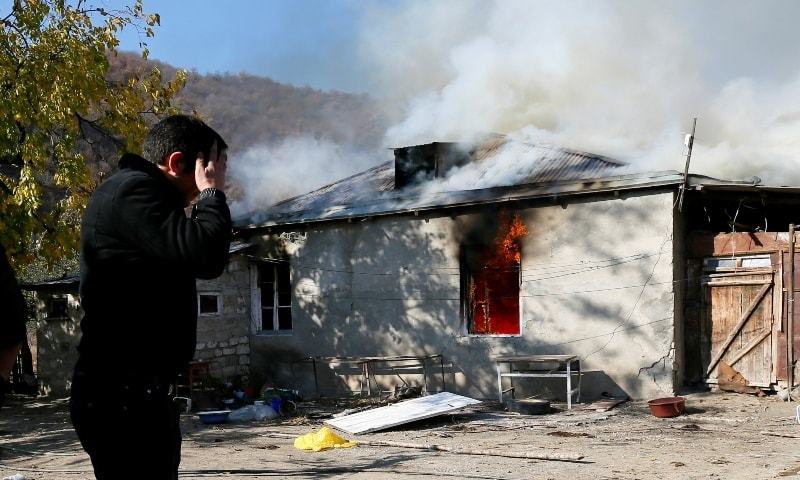Armenian Prime Minister Nikol Pashinyan, who has fuelled outrage over a controversial peace deal with Azerbaijan, called on Monday for a halt to violence after reports of an attempt on his life.
Last week, Pashinyan announced a Moscow-brokered peace deal that ended weeks of heavy fighting over the disputed region of Nagorno-Karabakh that left at least 2,400 dead and displaced tens of thousands.
Armenia agreed to cede parts of the region to Azerbaijan as well as other territories controlled by Armenian separatists since a 1990s post-Soviet war.
After the deal was announced, thousands of protesters took to the streets of the Armenian capital Yerevan, calling Pashinyan a “traitor” and demanding his resignation. Protesters also stormed government buildings.
On Monday, Pashinyan appealed for calm.
“Today I clearly stated that violence or the provoking of violence (especially armed violence) cannot in any way be a means of action for the government,” Pashinyan said on Facebook.
Pashinyan said he expected the opposition to also declare that it did not back “any violent action”.
Authorities on Saturday said they thwarted a plot to assassinate the prime minister and arrested opposition leader Artur Vanetsyan, the former head of Armenia's security services.
Vanetsyan, leader of the centre-right “Homeland” party, was released on Sunday after a court ruled that his detention lacked legal grounds.
A dozen opposition leaders were detained last week for inciting riots but were also released by courts.
Nagorno-Karabakh declared independence from Azerbaijan nearly 30 years ago but it has not been recognised internationally, even by Armenia.
Armenian foreign minister resigns
Also on Monday, Armenian Foreign Minister Zohrab Mnatsakanyan resigned from his post in a sign of the political fall-out of the ceasefire deal.
Mnatsakanyan, whose departure was announced by the ministry's spokeswoman on its Facebook page, had held the position since May 2018.
On Monday, hundreds of protesters rallied in the capital Yerevan's central Freedom Square.
The ceasefire signed by leaders of Armenia, Azerbaijan and Russia on November 10 halted military action in and around Nagorno-Karabakh, an enclave internationally recognised as part of Azerbaijan but populated by ethnic Armenians. Some 2,000 Russian peacekeeping troops are now being deployed to the region.
Mnatsakanyan met Azeri counterpart Jeyhun Bayramov three times in the past month-and-a-half in search of a ceasefire arrangement, but each effort quickly broke down.
For over 25 years until fighting over Nagorno-Karabakh resumed on September 27, ethnic Armenians held military control over the entire mountainous pocket and substantial swathes of Azeri territory ringing it. But when the guns fell silent, they had lost much of the enclave itself — including its second city Shushi, which Azeris call Shusha — as well as adjoining terrain.
Pashinyan said on Monday the war could have been avoided if Armenia had voluntarily ceded control of seven regions surrounding Nagorno-Karabakh as well as Shushi. “But we took up the challenge of war,” he told a news conference.
Foreign Ministry spokeswoman Anna Naghdalyan wrote on Facebook shortly afterwards that giving up Shushi was never on the agenda at any stage of negotiations between the sides.
Pashinyan said the road through the Lachin region that connects Nagorno Karabakh with Armenian state territory would be reopened later on Monday, and that many displaced residents of the enclave were returning to their homes.
Russian President Vladimir Putin held a phone call with French counterpart Emmanuel Macron on Monday to discuss the situation in Nagorno-Karabakh, the Kremlin said.
The two leaders said the situation in the South Caucasus region had generally stabilised and that it was time to address humanitarian issues, including the return of refugees and the preservation of Christian churches and monasteries.














































